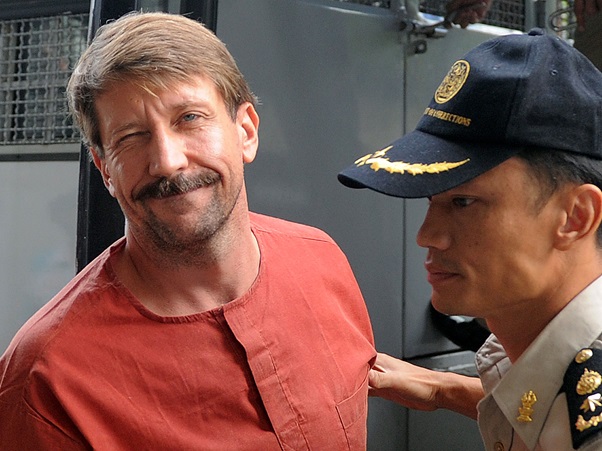By David Pratt
Up until last Friday he was someone most people had probably never heard of. But for journalists like myself whose beat is covering foreign affairs, the Russian arms dealer Viktor Bout was always a man somewhere on our radar.
In fact, it’s probably fair to say that in the vast majority of conflicts I’ve covered these past decades, especially in sub-Saharan Africa, the man dubbed the “Merchant of Death,” has been inextricably connected. From Angola to Rwanda, Sierra Leone to Liberia, Bout’s shadowy presence has always circled like some omnipresent vulture.
At 55 years old, Bout who speaks at least six languages, is the most well-known arms trafficker of his time and said to have profited from weapons that fuelled conflict not only wars in Africa but the Middle East, Asia and Latin America.
Such is his reputation that the film called Lord of War starring Nicolas Cage, is said to be loosely based on Bout’s life. But as the journalist and author Matt Potter who was involved in the making of the award-winning documentary, The Notorious Mr Bout, observed a few days ago, Bout’s time in the spotlight only serves to “obfuscate the reality” of his crimes and trade.
“The problem with getting hung up about spectacular rock-star characters like The Merchant of Death is you get blinded to the reality of the illicit arms trade,” said Potter who has written and studied this shadowy business.
“The people driving the illicit arms trade are the same ones driving the licit trade. And they are the people whose names you won’t’ see in the news,” Potter rightly pointed out in a piece for Time magazine in the wake of Bout’s release.
While so much of Bout’s real background remains unclear what is abundantly evident, is that the crimes for which he was sentenced to 25 years imprisonment are almost ludicrously disproportionate to that of possession of a single gram of cannabis oil, for which Britney Griner, the US basketball star was detained in Russia since February.
To say that news of the prisoner exchange that saw both of them returned to their native countries on Friday was received very differently in certain quarters would be a huge understatement.
It’s not that those US critics of Bout’s release didn’t want to see Griner back home, but more that they realised the precedent Bout’s return to Russia could set. The simple fact is it potentially provides Russian president Vladimir Putin with badly needed diplomatic leverage by using similar swaps in future.
In fact, when asked at a summit in Kyrgyzstan on Friday whether other US-Russia prisoner exchanges could take place, Putin responded: “We aren’t refusing to continue this work in the future.”
He added that “everything is possible” and noted that “compromises” had been found to clear the way for Thursday’s swap.
Such scenarios are troubling for some Russia watchers who maintain it carries risk by encouraging Russia to take hostages as a means of winning concessions. There are other factors at play here too with many analysts suggesting the Bout has links to Russian military intelligence and allies of Putin in the Kremlin.
As The Washington Post highlighted a few days ago these ties might include Igor Sechin, a former deputy prime minister of Russia and an ally of President Putin. Both Sechin and Bout served with the Soviet military in Africa during the 1980s.
The point is that the Kremlin has pushed for more than a decade to get Bout released so he clearly is of considerable value. Putin certainly will get considerable credit for Bout’s return and right now this serves him well in currying favour with some of his top military officials at a time when the president is under tremendous pressure over failures in the war in Ukraine.
As the UK based expert on Russian security Mark Galeotti commented earlier this year, before Bout’s release, freeing him would send a message to others who could end up in trouble: “The motherland will not forget you.”
But perhaps the most significant fact regarding the timing of Bout’s release is that it comes at the height of Russia’s war in Ukraine. Could it be that Bout’s ‘skillset’ might prove invaluable at a time when Russia is looking for arms not least Iranian drones that Moscow purchases and ships illicitly through Turkey.
As journalist Matt Potter – whose new book We Are All Targets traces the crowdsourcing of war – points out, “these are dark times…and the dark flow of money and commodities is battering democracies.” And that, as we all know, has forever been Viktor Bout’s stock in trade. Source: heraldscotland.com







